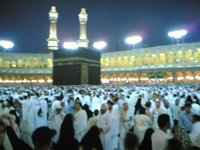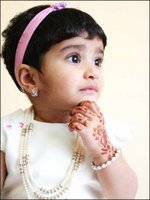Eid ul-Fitr

Eid ul-Fitr (Arabic: عيد الفطر), often abbreviated as simply Eid, sometimes spelled Eid al-Fitr in the Roman alphabet, is an Islamic holiday that marks the end of Ramadan, the month of fasting. Fitr means "to break" and therefore symbolizes the breaking of the fasting period and of all sinful habits. On the day of the celebration, a typical Muslim family gets up very early and attends special prayers held only for the occasion in mosques, in large open areas, stadiums or arenas. The prayer is generally short, and is followed by a khutba. The festivities and merriment start after the prayers with visits to the homes of friends and relatives and thanking the Creator for all blessings. Eid is a time to come together as a community and to renew friendship and family ties. This is a time for peace for all Muslims in the world to devote to prayers and mutual well-being.
It is a joyous occasion with important religious significance. Happiness is observed at attaining spiritual uplift after a month of fasting. Muslims dress in holiday attire. After attending the special congregational prayer in the morning, worshippers greet and embrace each other in a spirit of peace, love, and brotherhood. Visiting friends and relatives is common.
For Muslims, Eid ul-Fitr is a joyful celebration of the achievement of enhanced piety. It is a day of forgiveness, moral victory and peace, of congregation, fellowship, brotherhood and unity. Muslims are not only celebrating the end of fasting, but thanking God for the help and strength that they believe he gave them throughout the previous month to help them practice self-control.
Common greetings during this three-day festival are the Arabic greeting "Eid mubarak", "Eid saeed" or its Urdu variation "Eid mubarak!" which, loosely translated, means "Happy Eid!". In many parts of Southeast Asia, it is common to greet people with "Selamat Hari Raya" or "Selamat Idul Fitri" which means "Happy Eid" in Malay and Indonesian. In Indonesia and Malaysia, more people greet another Muslims with "Maaf zahir dan batin" which means "I'm sorry physically and spiritually", because in Indonesia and Malaysia, Eid-ul-Fitr is not only for celebrations, it is also the time for Muslims to clean their sins.
The first Eid was celebrated in 624 CE by the Prophet Muhammad [S.A.peace be upon him] with his companions and relatives after the victory of the Battle of Badr.
The holiday follows the month of Ramadan, falling on the first day of Shawwal (the tenth month in the Islamic calendar). As with all months in the Islamic calendar, it begins with the sighting of the new moon. For this reason there may be regional differences in the exact date of Eid, with some Muslims fasting for 29 days and some for 30 days.
Eid ul-Fitr commemorates the end of the month of Ramadan. Fasting is forbidden on this day as it marks the end of the month-long fast of Ramadan. A Muslim is encouraged to rise early and partake of some dates or a light, sweet snack, significant because for the past 30 days they have abstained from all food and drink from dawn till dusk. Many Muslims feel a sense of loss or sadness at the passing of Ramadan.

Muslims are encouraged to dress in their best clothes, new if possible, and to attend a special Eid prayer that is performed in congregation at mosques or open areas like fields, squares etc. When Muslims finish their fast at the last day (29th or 30th Ramadan), they congregate Takbir:
Allahu akbr, Allahu akbr, Allahu akbr,
la illaha ila Allah,
wa Allahu akbr, Allahu akbr
wa lillah hilhamd
God is the Greatest, God is the Greatest, God is the Greatest
There is no deity but [the One] God
God is Greatest, God is Greatest
and to Him goes all praise
The Takbir is recited after confirmation that the moon of Shawwal is sighted on the eve of the last day of Ramadan. It continues until the start of the Eid prayer. Before the Eid prayer begins every Muslim (man, women or child) must pay Zakat al Fitr, an alms for the month of Ramadan. This equates to about 2 kg of a basic foodstuff (wheat, barley, dates, raisins, etc.), or its cash equivalent, and is (typically) collected at the mosque. This is distributed by the mosque to needy local Muslims prior to the start of the Eid prayer. It can be given anytime during the month of Ramadan and is often given early, so the recipient can utilise it for Eid purchases. This is distinct from Zakat based on their wealth, which must be paid to a worthy charity. This is calculated at 2.5% of their wealth.
The Eid prayer (salah) is followed by the khutba (sermon) and then a prayer (dua') asking for forgiveness, mercy and help for the plight of Muslims across the world. It is then customary to embrace the persons sitting on either side of you as well as your relatives, friends and acquaintances.

Children are normally given gifts or money. Women (particularly relations) are normally given special gifts by their loved ones. Eid is also the time for reconciliations. Feuds or disputes, especially between family members, are often settled on Eid
In Indonesian the feast is named Hari Raya Idul Fitri or informally, Lebaran. Hari Raya literally means The Great Day of (Celebration) . Sometimes, there are different statements on when the day falls, especially between Muhammadiyah and Nahdlatul Ulama, because people use different techniques to determine it. Almost all of the people follows the government of Indonesia's statement and such differences do not get in the way of people celebrating. This event is recognized as national holiday and starts a few days before Idul Fitri and lasts some days after it. Schools also have different schedule for the holiday as many Islamic schools usually make it a longer holiday. Muslims in Indonesia usually ask forgiveness from their relatives and friends after the special prayer. Another interesting Idul Fitri tradition in Indonesia is mudik that usually applies to urbanites who came to Jakarta from the other provinces of Java or other islands in Indonesia. Before Idul Fitri comes, people will go back to their hometowns where their relatives, sometimes including their parents, reside. This event often causes crowding in airports, seaports, and bus stations while some who are travelling by car are trapped in the traffic jam for hours. For little children, asking for money as well as forgiveness from relatives is common to motivate them. Many, especially in the cities, also use the term angpau for the money just like Chinese people do.

At the night of the last day of Ramadan, Indonesians usually do 'Takbiran'. Takbiran is a big celebration, people, from little children to old men, recite the takbir with a microphone in a parade. They travel around the town and usually they hit 'bedug', a large drum, as a background music of the takbir.
Minal Aidzin Wal Faidzin
Taqabalallahu Mina Waminkum
Taqabal yaa Karim..........


0 Comments:
Post a Comment
<< Home